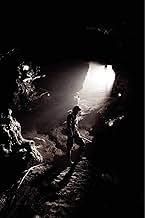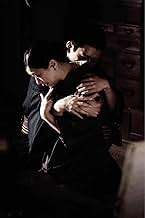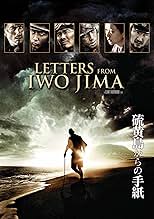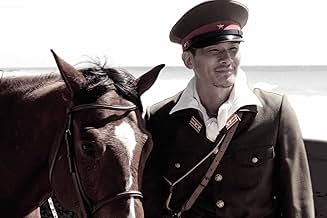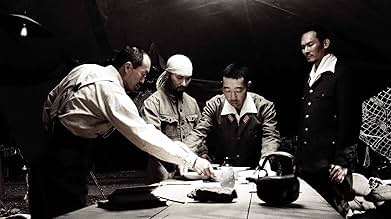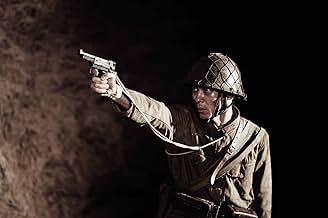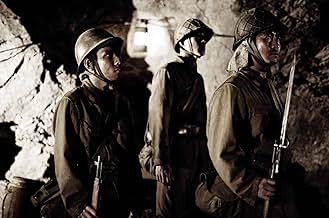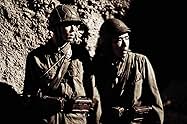द्वितीय विश्व युद्ध के दौरान संयुक्त राज्य अमेरिका और इंपीरियल जापान के बीच इवो जिमा की लड़ाई की कहानी, जैसा कि जापानियों के दृष्टिकोण से बताया गया है।द्वितीय विश्व युद्ध के दौरान संयुक्त राज्य अमेरिका और इंपीरियल जापान के बीच इवो जिमा की लड़ाई की कहानी, जैसा कि जापानियों के दृष्टिकोण से बताया गया है।द्वितीय विश्व युद्ध के दौरान संयुक्त राज्य अमेरिका और इंपीरियल जापान के बीच इवो जिमा की लड़ाई की कहानी, जैसा कि जापानियों के दृष्टिकोण से बताया गया है।
- 1 ऑस्कर जीते
- 25 जीत और कुल 39 नामांकन
Shidô Nakamura
- Lieutenant Itô
- (as Shidou Nakamura)
Luke Eberl
- Sam
- (as Lucas Elliot)
Sonny Saito
- Medic Endô
- (as Sonny Seiichi Saito)
फ़ीचर्ड समीक्षाएं
The film concerns about General Kuribayashi(Ken Watanabe)who takes command of the troops on the island of Iwo Jima, he's responsible for the defense of the island from the US army , one of the most difficult campaigns of the Pacific theater. While a young soldier named Saigo(Ninomiya) faces the war horror. When the battle starts , both Kuribayashi and Saigo encounter courage, bravery, and honor.The picture is magnificently directed by Clint Eastwood(Flag of our fathers), and his son Kyle Eastwood realized an atmospheric musical score. Appropriate and colorful cinematography by Tom Stern. Spectacular production design by Henry Bumstead in his last film , he usually worked for Alfred Hitchcock and Clint Eastwood. Splendid screenplay by Paul Haggis(also producer along with Steven Spielberg). Rating : Above average, well worth watching.
Adding more details over the largely described on the movie, the events happened of the following manner: Iwo Jima is a tiny island of volcanic rock and black sand. It has no natural water supply and covers just 8 square miles. Its capture was vital to the US war effort , however. It was one of the inner ring of islands protecting mainland Japan. It also lay almost halfway between the Japanese home island and the Marianas which had been occupied by US forces in mid-1944. The island was defended by 21.000 Japanese. The commander , Major General Kuribayashi had worked hard to add to the natural defenses , especially around Mount Suribachi and in the North. He had built one of the most formidable defensive complexes of the war. It had miles of tunnels and trenches , hundred of underground emplacements, antitank ditches and mini-fields. Kuribayashi knew that the garrison had no hope of any outside help and could not withdraw from the island. He ordered his men to fight and die in their trenches. They should kill as many enemy as possible, using the network of tunnels to get destruction squads, joining a squad meant almost certain death. Kuribayashi chose not to oppose the initial landings on the beaches. He would lure the US troops inland into the web of defensive positions in the interior. The US invasion was code-named operation detachment. When US bombers began attacking was bombed every day in what was the longest and heaviest aerial bombardment of the whole Pacific war. The landings involved 800 warships, manned by a total of 220.000 crew. About 110.000 troops were to take part in the initial assault of follow-on landings. The landings themselves were responsibility of three Marine Divisions under the command of Major General Harry Schmidt. US Marines took cover from Japanese fire on a beach of volcanic sand, March 5,1945 and Mount Suribachi rises behind them. The island was declared secure on March 26, the 36 days of fighting had taken a terrible toll on both sides. Some 5.931 Marines had been killed and 17.372 wounded. There were also about 2.800 naval casualties. The precise number of Japanese dead is not known. Only 216 men surrendered during the fighting, although another 900 or so surrendered later. The rest of the 21.000 troops died. The intensity of the fighting for Iwo Jima worried US commanders and politicians. The Japanese had been willing to die almost to a man to protect a tiny part of their homeland. They had inflicted severe losses on the US forces.
Adding more details over the largely described on the movie, the events happened of the following manner: Iwo Jima is a tiny island of volcanic rock and black sand. It has no natural water supply and covers just 8 square miles. Its capture was vital to the US war effort , however. It was one of the inner ring of islands protecting mainland Japan. It also lay almost halfway between the Japanese home island and the Marianas which had been occupied by US forces in mid-1944. The island was defended by 21.000 Japanese. The commander , Major General Kuribayashi had worked hard to add to the natural defenses , especially around Mount Suribachi and in the North. He had built one of the most formidable defensive complexes of the war. It had miles of tunnels and trenches , hundred of underground emplacements, antitank ditches and mini-fields. Kuribayashi knew that the garrison had no hope of any outside help and could not withdraw from the island. He ordered his men to fight and die in their trenches. They should kill as many enemy as possible, using the network of tunnels to get destruction squads, joining a squad meant almost certain death. Kuribayashi chose not to oppose the initial landings on the beaches. He would lure the US troops inland into the web of defensive positions in the interior. The US invasion was code-named operation detachment. When US bombers began attacking was bombed every day in what was the longest and heaviest aerial bombardment of the whole Pacific war. The landings involved 800 warships, manned by a total of 220.000 crew. About 110.000 troops were to take part in the initial assault of follow-on landings. The landings themselves were responsibility of three Marine Divisions under the command of Major General Harry Schmidt. US Marines took cover from Japanese fire on a beach of volcanic sand, March 5,1945 and Mount Suribachi rises behind them. The island was declared secure on March 26, the 36 days of fighting had taken a terrible toll on both sides. Some 5.931 Marines had been killed and 17.372 wounded. There were also about 2.800 naval casualties. The precise number of Japanese dead is not known. Only 216 men surrendered during the fighting, although another 900 or so surrendered later. The rest of the 21.000 troops died. The intensity of the fighting for Iwo Jima worried US commanders and politicians. The Japanese had been willing to die almost to a man to protect a tiny part of their homeland. They had inflicted severe losses on the US forces.
At the conclusion of the film a person behind me said, "Incredible," twice. Another person followed with, "A masterpiece." I would concur. Perhaps it isn't a perfect film but it is a movie with great impact. I find that it is a testament to the skill of Clint Eastwood as a director and Iris Yamashita as screenwriter that some of the scenes that had the greatest impact were of minor thingsa letter read out loud, the way someone saluted, a tear, a song...
There were no clear cut heroes or villains beyond "war" itself. I'm reminded of that saying, "No one wins a war. One side simply loses more than the other." War diminishes us all. We must learn to turn our backs on such endeavors even if it means that the military/industrial death merchants take a cut in profits or that they truly learn to hammer swords into plow shares.
If the film were to depict the battle in a manner that was realistically experienced by the soldiers the film would be unbearable to any viewer. One must see the battle and history as a kind of allegorical backdrop to a story about the utter inhumanity and futility of war. As a film it had to illustrate the overall societal insanity of war through a human lens, and it did this in a deeply moving way.
There were no clear cut heroes or villains beyond "war" itself. I'm reminded of that saying, "No one wins a war. One side simply loses more than the other." War diminishes us all. We must learn to turn our backs on such endeavors even if it means that the military/industrial death merchants take a cut in profits or that they truly learn to hammer swords into plow shares.
If the film were to depict the battle in a manner that was realistically experienced by the soldiers the film would be unbearable to any viewer. One must see the battle and history as a kind of allegorical backdrop to a story about the utter inhumanity and futility of war. As a film it had to illustrate the overall societal insanity of war through a human lens, and it did this in a deeply moving way.
Don't listen to the people who call this movie inaccurate or revisionist history.
The movie is accurate. There were people on both sides of the war who at times showed kindness.
Labeling all the Japanese soldiers as people who tortured POWS would be like saying all American soldiers in Vietnam killed and rape innocent Vietnamese. Or all American soldiers in Cuba tortured POWS from the wars in the Middle East. You can't group people together like that.
This movie shows better than any other film that there's really no good guys or bad guys when it comes to war. War is just pointless.
The movie is not supposed to be a documentary so the people who bash it for little details should go rent a documentary if thats what they want to see.
Also, Clint Eastwood deserves major credit for telling both sides of the war. Too many war movies always show the enemy as "heartless monsters" when it reality its never like that.
This is without a doubt the best movie of the year. Make sure you go see it.
The movie is accurate. There were people on both sides of the war who at times showed kindness.
Labeling all the Japanese soldiers as people who tortured POWS would be like saying all American soldiers in Vietnam killed and rape innocent Vietnamese. Or all American soldiers in Cuba tortured POWS from the wars in the Middle East. You can't group people together like that.
This movie shows better than any other film that there's really no good guys or bad guys when it comes to war. War is just pointless.
The movie is not supposed to be a documentary so the people who bash it for little details should go rent a documentary if thats what they want to see.
Also, Clint Eastwood deserves major credit for telling both sides of the war. Too many war movies always show the enemy as "heartless monsters" when it reality its never like that.
This is without a doubt the best movie of the year. Make sure you go see it.
10max-745
I have watched this film twice already this week (first week of release here in Japan). I am an American living in Japan for the past twenty two years and have yet to see such a strong performance from an (almost) all-Japanese cast. This movie draws you into the caves and makes you a part of the Japanese soldier's life. The main characters all have an interesting story to tell. But in the end the message is clear. War is futile.
The strangest part of all. Clint Eastwood has made a Japanese movie that the Japanese should have made. There is almost no way to tell it was a "foriegn" production until you see the credits.
The strangest part of all. Clint Eastwood has made a Japanese movie that the Japanese should have made. There is almost no way to tell it was a "foriegn" production until you see the credits.
I was not one of those who was really taken with "Flags Of Our Fathers." I thought the story was rather lacklustre and lacking to be honest, and so had little interest in "Letters From Iwo Jima." This is the sort of sequel to "Flags" - or it might be better called a companion to "Flags." Both were directed by Clint Eastwood and "Letters" shows the story of the Battle of Iwo Jima from the Japanese perspective - and much to my surprise I liked this movie very much. It was, I thought, by far superior to "Flags."
Most American movies dealing with World War II in the Pacific do so from a specifically American perspective that portrays the Japanese in an unflattering light. That's understandable. In the context of World War II, after all, Japan was the enemy. But "Letters" takes a very personal and human look at the Japanese soldiers assigned to Iwo Jima's defence. To me, the point that was being made was how much alike the Japanese and the Americans were. Both were fighting for their countries; both had little knowledge of the other, and therefore had distorted views of the other; both were doing their duties as they understood it. And, of course, the movie is based on letters supposedly written by Japanese soldiers on Iwo Jima - addressed to wives and mothers and other family. This is a surprisingly sympathetic look at the Japanese, something I really wasn't expecting from Clint Eastwood.
The story focuses on Japanese General Tadamichi Kuribayashi, who commanded the Japanese defence of Iwo Jima. Kuribayashi was a man well acquainted with the United States, having lived there for two years on a military exchange, and he had no illusions about Japan's ability to win the war, largely seeing Iwo Jima as a suicide mission from which he wouldn't return. He's portrayed very well here by veteran Japanese actor Ken Watanabe. The movie is almost entirely in Japanese (except for some brief scenes that feature American soldiers) with subtitles, but - although I'm usually not big on subtitles - this didn't really distract me. They were appropriate to this movie and provided a sense of authenticity.
This isn't a "war movie" in the normal sense of the war. Although there are battle scenes (and some of it is mildly graphic) it is for the most part the personal stories of the Japanese soldiers that dominate. It's extremely well done, and deserves a lot of credit for showing a side of the Japanese soldier in World War II that's rarely shown. (8/10)
Most American movies dealing with World War II in the Pacific do so from a specifically American perspective that portrays the Japanese in an unflattering light. That's understandable. In the context of World War II, after all, Japan was the enemy. But "Letters" takes a very personal and human look at the Japanese soldiers assigned to Iwo Jima's defence. To me, the point that was being made was how much alike the Japanese and the Americans were. Both were fighting for their countries; both had little knowledge of the other, and therefore had distorted views of the other; both were doing their duties as they understood it. And, of course, the movie is based on letters supposedly written by Japanese soldiers on Iwo Jima - addressed to wives and mothers and other family. This is a surprisingly sympathetic look at the Japanese, something I really wasn't expecting from Clint Eastwood.
The story focuses on Japanese General Tadamichi Kuribayashi, who commanded the Japanese defence of Iwo Jima. Kuribayashi was a man well acquainted with the United States, having lived there for two years on a military exchange, and he had no illusions about Japan's ability to win the war, largely seeing Iwo Jima as a suicide mission from which he wouldn't return. He's portrayed very well here by veteran Japanese actor Ken Watanabe. The movie is almost entirely in Japanese (except for some brief scenes that feature American soldiers) with subtitles, but - although I'm usually not big on subtitles - this didn't really distract me. They were appropriate to this movie and provided a sense of authenticity.
This isn't a "war movie" in the normal sense of the war. Although there are battle scenes (and some of it is mildly graphic) it is for the most part the personal stories of the Japanese soldiers that dominate. It's extremely well done, and deserves a lot of credit for showing a side of the Japanese soldier in World War II that's rarely shown. (8/10)
क्या आपको पता है
- ट्रिवियाShot back-to-back with Flags of Our Fathers (2006).
- गूफ़When the soldiers in the cave commit suicide they use what look like type 97 hand fragmentation grenades held close to their chests.
The point of most grenades is to send out numerous fragments as fast-flying projectiles killing those close by (a few yards) or seriously injuring those further away.
However, even though the soldiers are all standing a few feet apart, as each grenade explodes only the person holding it is affected.
- भाव
General Tadamichi Kuribayashi: If our children can live safely for one more day it would be worth the one more day that we defend this island.
- साउंडट्रैकString Quartet No.6, Op. 1-6, Hob. III-6, Mov.2
Composed by Joseph Haydn
At a party where Ken Watanabe participated
टॉप पसंद
रेटिंग देने के लिए साइन-इन करें और वैयक्तिकृत सुझावों के लिए वॉचलिस्ट करें
- How long is Letters from Iwo Jima?Alexa द्वारा संचालित
- What is "Letters from Iwo Jima" about?
- Is "Letters from Iwo Jima" based on a book?
- Is seeing "Flags of Our Fathers" important for understanding this movie?
विवरण
- रिलीज़ की तारीख़
- कंट्री ऑफ़ ओरिजिन
- आधिकारिक साइटें
- भाषाएं
- इस रूप में भी जाना जाता है
- Cartas desde Iwo Jima
- फ़िल्माने की जगहें
- उत्पादन कंपनियां
- IMDbPro पर और कंपनी क्रेडिट देखें
बॉक्स ऑफ़िस
- बजट
- $1,90,00,000(अनुमानित)
- US और कनाडा में सकल
- $1,37,56,082
- US और कनाडा में पहले सप्ताह में कुल कमाई
- $89,097
- 24 दिस॰ 2006
- दुनिया भर में सकल
- $6,86,73,228
- चलने की अवधि2 घंटे 21 मिनट
- रंग
- ध्वनि मिश्रण
- पक्ष अनुपात
- 2.39 : 1
इस पेज में योगदान दें
किसी बदलाव का सुझाव दें या अनुपलब्ध कॉन्टेंट जोड़ें







